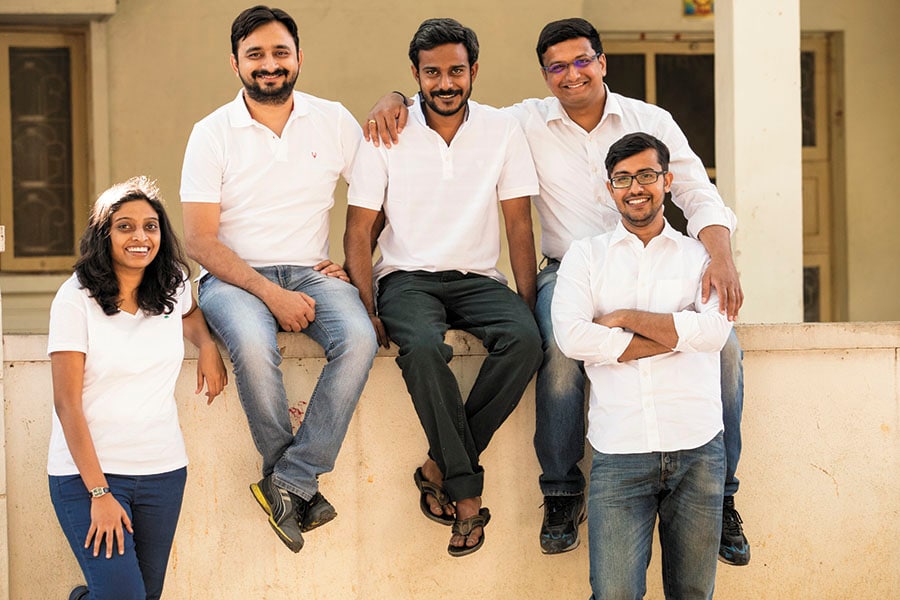
Online self-publishing goes desi
Fledgling platforms that provide content in Indian languages are stepping into a nascent but high-potential field

Mahendra Sharma (left) and Nilesh Shah, co-founders of the Matrubharti app that has over 5,000 literary works
Stories are an imperative part of the human experience. Whether we consume them as television dramas or Hollywood films or Stephen King novels, they underscore our need to share and encounter different narratives. As the internet becomes an integral part of the human existence, it has become a place for people to gather and share stories.
Online platforms and internet-based apps provide writers with a space to tell their stories, and readers with a space to interact with each other and with the author. FictionPress (founded in 1998) and Wattpad (launched in 2006) have captured over 60 million online readers in the US, Canada, the UK, and many other countries. India is just recently becoming a market for such platforms as more people gain access to the internet.
Wattpad has been accessible in India since it was launched, but only in the past couple of years has it taken off among the Indian consumer base; this August alone, 1.3 million users from India accessed Wattpad’s website to add to or consume content.
Another app-based platform that is gaining traction is Juggernaut Books, which was launched in early 2016. It features a range of Indian authors, including well-known faces like actor Sunny Leone who writes serialised fiction exclusively for the app, as well as publishes books on subjects that are current and relevant to Indian audiences.
However, both Juggernaut and Wattpad face a dilemma: The vast majority of their content is in English, while most Indians prefer to read in their native regional languages. Not surprisingly then, in the last couple of years, the market has opened up for entrepreneurs to provide readers and writers of Indian regional languages with self-publishing platforms.
Pratilipi, a website featuring content in eight languages, and Matrubharti, an app featuring content in six languages, are currently two of the top platforms that are catering to this demand.
Bengaluru-based Pratilipi, the older of the two platforms, was launched in September 2014 by Ranjeet Pratap Singh (28), Prashant Gupta (29), Rahul Ranjan (30), Sahradayi Modi (29), and Sankaranarayanan Devarajan (27). The founders self-funded the platform until they managed to raise Rs 30 lakh from TLabs (Times Internet Accelerator) in March 2015; they raised another $1 million from investors led by Nexus Venture Partners this year.
“We started Pratilipi because there are a lot of people in the country who want to read in Indian languages,” says Singh, the CEO of the company. “If you look online today, there is hardly any literature in Indian languages. The content in all Indian languages combined is less than 0.01 percent [of the total content]. This means that a great number of people, even if they go online, do not find content to consume.”
Singh speaks of his desire to eliminate language as a barrier for people who want to read online. Passionate about solving what he saw as a problem, he set out to create the website that now has around 750,000 users who visit the site at least once a month and over 30,000 pieces of content in Hindi, Gujarati, Bengali, Marathi, Malayalam, Tamil, Kannada and Telugu. This content includes fiction, non-fiction, out-of-copyright materials in these languages, and other forms like poetry.
For Mahendra Sharma (37), one of the two founders of Matrubharti, the motive for creating the app was more personal: He felt the need for a place where he could read and also publish his stories in his native language, Sindhi. “I started an IT career, and over the next 14 years I earned some money,” says Sharma. “In these years, I found a gap between my profession and my passion [literature]; I wanted to combine both so Matrubharti came into being.”
As the founder of Sharma Infoway, a software company based in Ahmedabad, he employed people who could help him in his endeavour; along with his co-founder Nilesh Shah (52), Sharma designed and launched the Matrubharti app in early 2015. Initially funded by Sharma, the app recently received funding of Rs 20 lakh from Venture Investments Holding. It has been downloaded around 75,000 times, on iOS and Android devices, and has over 5,000 pieces of content in Gujarati, Hindi, Marathi, Tamil, Bengali and English.

Image: Selvaprakash Lakshmanan for Forbes India
Both Pratilipi and Matrubharti are relatively new and are yet to break even. In fact, Pratilipi hasn’t even started to monetise. “Think about it this way: If you see any consumer-focussed company like Facebook, Twitter, Wattpad or WhatsApp, it typically starts monetising only after reaching a certain scale of 50 or 100 million users,” explains Singh.
Pratilipi provides a user-friendly system for readers to rate and comment on stories. In the future, there will even be social media support on the website, says Singh, who hopes to reach millions of users in India through the website and through an app that is currently being developed.
The business model Singh prefers takes a percentage out of the authors’ earnings from the platform once the website allows them to charge for content; currently authors have to publish without payments. While the growing reader base of Pratilipi is testament to its strength as a platform, it is up for debate whether this model will yield the desired revenue.
Matrubharti, on the other hand, claims it will break even in the next couple of months because it employs a freemium model that offers an ad-heavy experience on its free platform or a premium experience for a subscription price. According to Sharma, around 7,500 users of the app have purchased the premium version (which costs Rs 399 for a year). The app not only makes money for itself, but also transfers some of the profits to the authors in order to encourage them to produce more content for the app.
“Authors are not a community that has been appreciated or has been making money, especially regional content creators. They haven’t been monetising their content,” Sharma says. “We want to encourage them and create opportunities for them to earn from this platform. That was one objective. The other reason is that we wanted authors to write more content.”
Novice authors can earn up to Rs 500 for a 1,000-word story and Rs 2,000 for a 2,000-word story after having published three free articles or stories. For a 100-page book, they can get Rs 5,000 if the content makes it past the editorial team. Matrubharti owns the copyright of the content it pays for, while the copyright of all free content remains with the authors.
This type of system comes with a caveat: The writing process becomes less democratic. Because the app expects to make money off readers, its managers are more invested in creating content for larger reader bases and excluding content that might offend readers. This app, unlike Pratilipi which allows anyone to publish anything, only has content that has been approved by an editorial team, which usually rejects about 35 percent of all submitted content. In this way, Matrubharti acts more like a publisher than a self-publishing platform and this might turn some readers away. For example, erotica is a main attraction on self-publishing platforms, but it is entirely absent on Matrubharti. However, guaranteed earnings is an attractive prospect for good authors who bring with them readership.
For a platform to take off, it must have content that generates a loyal readership and both these platforms are still working on this task. Both Matrubharti and Pratilipi offer online communities on their respective Facebook pages and provide feedback to authors who are just starting out. They say that their major form of exposure is through authors and readers who share the stories they read on social media. Additionally, Matrubharti also promotes itself in local fairs and has established a good network of Gujarati authors in Ahmedabad, where it is based—3,809 of its 5,737 content pieces are in Gujarati.
The regional language self-publishing market is still relatively new and the players in it are likely to encounter competition from home and abroad. Wattpad, although a Canada-based company, already has the largest Indian audience on a self-publishing platform and it also provides language support for at least 10 Indian languages. It also offers the largest readership as well as a refined system of monetisation that involves branded content and ad revenue. Wattpad has held writing contests like ‘Your Story’, which garnered many Hindi submissions. But the jury is still out on whether it will become the platform of choice for Indian language writers.
Even Juggernaut promises to have Hindi content on its platform soon, and more competitors are likely to enter the fray as these apps and websites gain traction.
(This story appears in the 30 November, -0001 issue of Forbes India. To visit our Archives, click here.)




